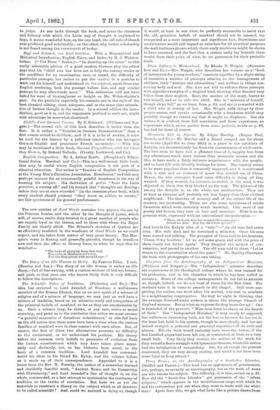ten weeks (April 9th to June 16th) in a place.
in the outskirts of
Kabylia, not inconveniently far from the conveniences of civilisation. The two seem to have had a pleasant time of it, happily free from
any adventures much more serious than mountain storms and the like, to have made a fairly intimate acquaintance with the people, and to have left with friendly feelings for them. The country seems to be more populous than is commonly supposed, and it is cultivated with a care and an economy of space that remind one of China. Hence, the two strangers found some difficulty in doing all they wanted. If they wanted, for instance, to sketch in the road, it was objected to them that they blocked up the way. The picture of life among the Kabylie is, on the whole, not unattractive. They are at least as virtuous and probably not less happy than their civilised neighbours. The sketches of scenery, and of the animal life of the country, are interesting. There are also some specimens of native lireratnre which were certainly worth inserting. Like most of our poetry and fiction, they turn on love and marriage. Here is an in- genuous wish, expressed without conventional circumlocution :—
" Thou, oh Lord, who has created the young p;as Grant me Alai. May the old fellow perish!"
And here is the Kabyle idea of a "tale."—" An old man had seven sons. His wife died, and he remained a widower. Once his sons were seated and talking. The youngest of them said to his brothers, 'Come, 0 my brothers ! let us sell some goats, and with the price of them marry our father again.' They dropped the subject of con- versation, and passed to another. The old man said to them, 'Let us return to the conversation about the goats.'" Mr. Barclay illustrates the book with photographs of his own taking.














































 Previous page
Previous page